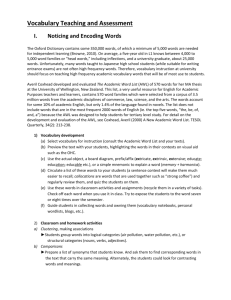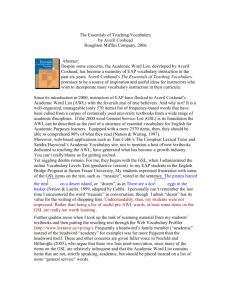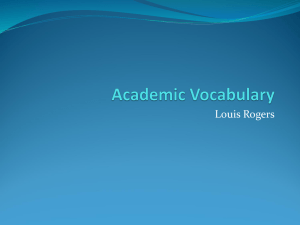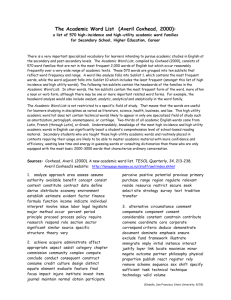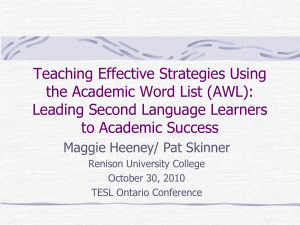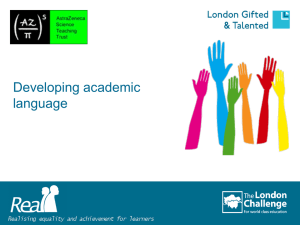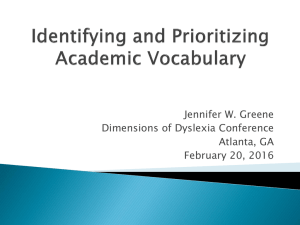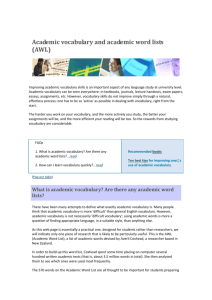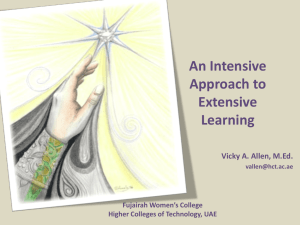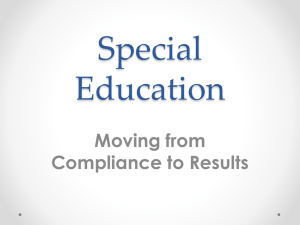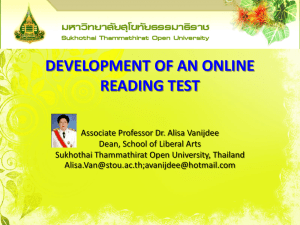Perspectives on Teaching and Learning Academic
advertisement
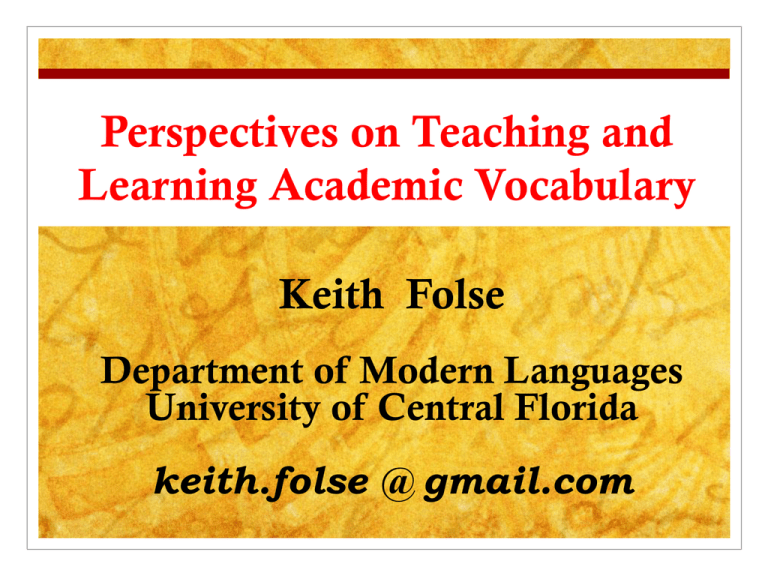
Perspectives on Teaching and Learning Academic Vocabulary Keith Folse Department of Modern Languages University of Central Florida keith.folse @ gmail.com An IEP Curriculum 9:00-9:50 Grammar 10:00-10:50 Reading 11:00-11:50 Elective 1:00-1:50 Communication 2:00-2:50 Writing Another IEP Curriculum 9:00-10:50 Grammar/Writing 11:00-11:50 Elective 1:00-2:50 Reading/Speaking/Listening Another IEP Curriculum 9:00-10:50 Grammar/Speaking/Listening 11:00-11:50 Elective 1:00-2:50 Reading/Writing What is Academic Language? What is Academic Language? (1) language that sounds academic “according to the previous research on which this study was based, several aspects of xyz emerged…” (2) a set of vocabulary that will enable you to understand academic texts ???? Does the AWL equal Academic Language? Does Academic Language equal the AWL? What is the Academic Word List? Coxhead a (2000) corpus study (3.5 million words) 570 For words (word families) a word to be designated as an AWL item, that word had to occur frequently in her corpus AND it had to appear across certain areas AND it had to appear in 15 of 28 subdisciplines Today’s Talk (blurb) Coxhead’s Academic Word List highlights the importance of vocabulary for academic study and has inspired a host of teaching materials and similar word lists. This panel revisits the notion of academic vocabulary, exploring it from different perspectives in order to offer teaching and learning ideas for IEP programs. Categorizing Words (function: a/the/of; content: cat/adjacent/fun) GSL 1000: _____, _____, _____ GSL 2000: _____, _____, _____ AWL: _____, _____, _____ OFF-LIST: _____, _____, _____ (1) Today’s Talk (blurb) Coxhead’s Academic Word List highlights the importance of vocabulary for academic study and has inspired a host of teaching materials and similar word lists. This panel revisits the notion of academic vocabulary, exploring it from different perspectives in order to offer teaching and learning ideas for IEP programs. Find the 6 AWL items? Coxhead’s Academic Word List highlights the importance of vocabulary for academic study and has inspired a host of teaching materials and similar word lists. This panel revisits the notion of academic vocabulary, exploring it from different perspectives in order to offer teaching and learning ideas for IEP programs. ***************************************** Today’s Talk (6) Coxhead’s Academic Word List highlights the importance of vocabulary for academic study and has inspired a host of teaching materials and similar word lists. This panel revisits the notion of academic vocabulary exploring it from different perspectives in order to offer teaching and learning ideas for IEP programs. What about the leftovers? Coxhead’s Academic Word List highlights the importance of vocabulary for academic study and has inspired a host of teaching materials and similar word lists. This panel revisits the notion of academic vocabulary exploring it from different perspectives in order to offer teaching and learning ideas for IEP programs. ************* Look at the GREAT LEFTOVERS Coxhead’s _______ Word List _______ the importance of vocabulary for _______ study and has inspired a host of teaching materials and _______ word lists. This _______ revisits the _______ of _______ vocabulary exploring it from different _______ in order to offer teaching and learning ideas for IEP programs. ****************************************** 1000? 2000? AWL? OFF? 0-1000 different ideas importance learning materials offer order study teaching word 1001-2000 exploring host list programs AWL academic highlights notion panel perspectives similar OFF coxhead iep inspired revisits vocabulary (2) wikipedia.org The Academic Word List (AWL) was developed by Averil Coxhead in New Zealand. The list contains 570 semantic fields which were selected because they appear with great frequency in a broad range of academic texts. The list does not include words that are in the most frequent 2000 words of English (the General Service List), thus many of the words are specific to academic contexts. Find the 6 AWL words? The Academic Word List (AWL) was developed by Averil Coxhead in New Zealand. The list contains 570 semantic fields which were selected because they appear with great frequency in a broad range of academic texts. The list does not include words that are in the most frequent 2000 words of English (the General Service List), thus many of the words are specific to academic contexts. wikipedia.org The Academic Word List (AWL) was developed by Averil Coxhead in New Zealand. The list contains 570 semantic fields which were selected because they appear with great frequency in a broad range of academic texts. The list does not include words that are in the most frequent 2000 words of English (the General Service List), thus many of the words are specific to academic contexts. What about the leftovers? The Academic Word List (AWL) was developed by Averil Coxhead in New Zealand. The list contains 570 semantic fields which were selected because they appear with great frequency in a broad range of academic texts. The list does not include words that are in the most frequent 2000 words of English (the General Service List), thus many of the words are specific to academic contexts. Look at the GREAT LEFTOVERS The _______ Word List (AWL) was developed by Averil Coxhead in New Zealand. The list contains 570 semantic fields which were _______ because they appear with great frequency in a broad _______ of _______ _______ . The list does not include words that are in the most frequent 2000 words of English (the General Service List), thus many of the words are _______ to _______ _______ . 1000? 2000? AWL? OFF? 0-1000 appear broad contains developed english fields general great include most new number service word 1001-2000 frequency list AWL academic contexts range selected specific texts OFF averil awl coxhead semantic zealand (3) webmd.com Find examples for GSL 1000, GSL 2000, AWL, and OFF 1000? 2000? AWL? 1000: best bodies day developing eat end even food going growing heavily long more need number problems time 2000: behavioral brains breakfast lot perform regular AWL: adults create period periods physical rely OFF: intake intellectual kids semistarvation skip 1000? 2000? AWL? 1. To function in an academic setting, you need A LOT of vocabulary. 2. The AWL is good, but it is not enough. 3. I can teach you the 570 words, but the students need to practice heavily. 4. Even with these 570, it’s still not enough. ************************************ In our classes… 1. Is academic vocabulary being taught? 2. If so, how? 3. But wait… To what degree is ANY vocabulary being taught? Is explicit vocabulary the reading teacher’s job? Reading in a Foreign Language April 2010, Vol. 22, No. 1, pp. 139-160 To find: Google RFL FOLSE 28 the study a case study one upper intermediate class at an IEP EVF: explicit vocabulary focus goal: number of EVFs in 1 week of classes (25 hrs) RQ: how many EVFs? where? who? why? 29 background TRAIN WRECK: ELLs + “lexical plight” Ss need to know 95%-98% of the words to comprehend a reading passage TIME CRUNCH: “Ss typically need to know words measured in thousands, not hundreds, but receive language instruction measured in months, not years” (Cobb, 1999, p. 345) Publications frequently conclude with “Ss need more vocab instruction,” BUT what is really happening right now? 30 Research Questions 1. To what extent is vocab being covered in an intensive English program? 2. Are explicit vocabulary focuses (EVFs) being initiated by the teacher, the students, or both? 3. Is there more attention to vocab in a particular course than in others? If so, why? 31 Students/Participants ① a typical IEP at a large university in 2002 ② Level 3 (upper intermediate) of a 4-level program ③ 475 on paper-based TOEFL; 4 on IELTS ④ 14 ELLs (1 Arabic; 1 French; 3 Japanese; 4 Korean; 1 Portuguese; 3 Spanish; 1 Thai) ⑤ 5 teachers of 5 classes (Communication, Composition, Grammar, Reading, TOEFL) ⑥ 1 Researcher (hid as a student in classes, multilingual) 32 RQ1: To what extent is vocab covered in an IEP? 121 EVFs/week, 24 EVFs/day, 4.8 EVFs/class often orally with no visual cues rarely wrote on the board rarely drew class attention to the word/meaning/strategy for remembering the word 33 problem: small number and limited quality An IEP Curriculum Is anyone teaching vocabulary? Where? Is it systematic (at all)? An IEP Curriculum 9:00-9:50 Grammar 10:00-10:50 Reading 11:00-11:50 Elective 1:00-1:50 Communication 2:00-2:50 Writing Another IEP Curriculum 9:00-10:50 Grammar/Writing 11:00-11:50 Elective 1:00-2:50 Reading/Speaking/Listening Another IEP Curriculum 9:00-10:50 Grammar/Speaking/Listening 11:00-11:50 Elective 1:00-2:50 Reading/Writing Where is vocab taught? it depends… “we all do that”… in the reading class… in the elective class… in the TOEFL class… Vocabulary Elective University of South Florida’s ELI summer 1999 new vocabulary elective Vocabulary in Use (McCarthy & O’Dell) In conclusion, In conclusion, DO SOMETHING! Focus on Vocabulary: Mastering the Academic Word List (Schmitt & Schmitt, Pearson)
